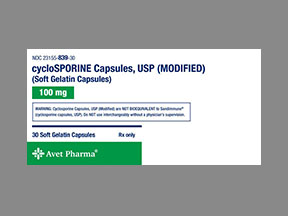
My prescription
Edit
100MG, Cyclosporine Modified (30 Capsules)
Select pharmacy

CVS
$50.93
COUPON PRICE
Albertsons
$31.08
COUPON PRICE
Walgreens
$45.58
COUPON PRICE
Walmart
$46.47
COUPON PRICECyclosporine Modified savings card
Show this card to your pharmacist
Albertsons
$31.08
BIN
ID
PCN
GRP
011867
LHCA650CB4
HT
LABH001
Powered by
More prescriptions for rheumatoid arthritis
More prescriptions for rheumatoid arthritis
Price history for Neoral (brand) & Cyclosporine Modified (generic)
30 Capsules, 100MG
Average retail price for Neoral
Average retail price for Cyclosporine Modified
Average SaveHealth price for Cyclosporine Modified
Our price history data is based on aggregated prescription data collected from participating pharmacies in America. Our prescription data updates daily to reflect the latest price changes. If you notice a missing data point, it means there wasn't sufficient data available to generate a monetary value for that date.
We analyzed Cyclosporine Modified prices for (100MG, 30 Capsules) over the last 12 months. The average retail price was $425.16, while the average price using the SaveHealth discount card was $56.68. That's a savings of approximately 86.67% when using our Cyclosporine Modified coupon.
Compared to the generic version, Neoral had an average price of $416.76 over the same time period. With the SaveHealth savings card, Cyclosporine Modified is 86.40% cheaper on average than Neoral.
*Retail prices are based on pharmacy claims data, and may not be accurate when we don't have enough claims.
Cyclosporine Modified dosage forms
Dosage Quantity Price from Per unit 25MG 1 Capsule $2.99 $2.99 25MG 30 Capsules $17.10 $0.57 25MG 60 Capsules $30.48 $0.51 50MG 1 Capsule $3.72 $3.72 50MG 30 Capsules $31.53 $1.05 100MG 30 Capsules $50.93 $1.70 100MG 1 Capsule $1.01 $1.01
| Dosage | Quantity | Price from | Per unit |
|---|---|---|---|
| 25MG | 1 Capsule | $2.99 | $2.99 |
| 25MG | 30 Capsules | $17.10 | $0.57 |
| 25MG | 60 Capsules | $30.48 | $0.51 |
| 50MG | 1 Capsule | $3.72 | $3.72 |
| 50MG | 30 Capsules | $31.53 | $1.05 |
| 100MG | 30 Capsules | $50.93 | $1.70 |
| 100MG | 1 Capsule | $1.01 | $1.01 |
